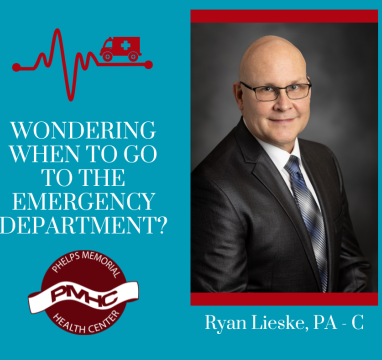Patients come to the emergency department to receive life-saving help for serious injuries or illnesses. Each injury or illness is different and it is important to try to figure out how serious your condition is. If you feel it is life-threatening or could cause permanent disability, you need to go to the emergency department. In some cases it is best to call 911 so that emergency medical services can provide care right away. Emergency departments are open 24 hours a day and 7 days a week so they are always available to deal with these life-threatening issues.
What symptoms or health issues may need an emergency room visit?
• Chest pains or difficulty breathing
• Weakness or numbness on one side of the body
• Slurred speech
• Visual problems such as loss of vision or double vision
• Severe dizziness
• Suspected broken bones or dislocated joints
• Head injuries loss of consciousness fainting or confusion
• Seizures lasting longer than 3 to 5 minutes
• Falls if you are taking blood thinners
• Bleeding that will not stop with home care measures
• Large cuts that may require sutures
• Fevers over 103 degrees that do not respond to Tylenol and ibuprofen
• Severe burns
• Severe pain in the abdomen or extremities
• Suspected or known poisoning or drug overdose
• Mental health crisis
• Swelling of the tongue lips or throat or other symptoms of severe allergic reaction
Emergency Services medical provider Ryan Lieske, PA-C, said “Being seen in the emergency department is not always ‘quicker and easier’ as some people think”. Emergency room wait times can be long depending on the severity of your symptoms and the number of other patients waiting. Emergency rooms typically treat patients based on the severity of their condition.
Many symptoms can be addressed by scheduling an appointment with your primary care provider. Symptoms such as:
• Wheezing or mild shortness of breath
• Sprains or strains
• Minor burns
• Small cuts with bleeding controlled
• Fevers under 103
• Flulike symptoms including sore throat and ear pain
• Eye drainage
• Vomiting and diarrhea
• Painful urination
• Animal and insect bites
• Minor allergic reactions
We know it can be difficult to decipher when to use the Emergency Department versus an urgent care or seeing your primary care provider, but there is one symptom that should never be ignored. “You should always go to the emergency department if you are experiencing chest pain.” Lieske says. While the answer is not always simple, knowing when and where to seek medical care can be life saving.



